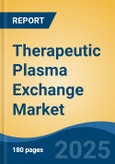Speak directly to the analyst to clarify any post sales queries you may have.
10% Free customizationThis report comes with 10% free customization, enabling you to add data that meets your specific business needs.
TPE is employed in the treatment of various autoimmune conditions, renal disorders, hematological disorders, and more, contributing to market expansion. Additionally, therapeutic plasma exchange (TPE) offers the significant benefit of reducing plasma viscosity. It is widely performed in the management of chronic diseases as a first-line or second-line therapy, or as a supportive treatment. During plasma exchange, a substantial portion of plasma containing toxins and other abnormal matter is extracted from the other blood components and replaced with replacement fluid, such as fresh frozen plasma (FFP) or albumin.
Key Market Drivers
High prevalence of Neurological, Renal, And Hematological Disorders
The high prevalence of chronic diseases, such as nephrological disorders, acute liver failure, Guillain-Barré Syndrome (GBS), and others, contributes to the growth of the overall therapeutic plasma exchange market. Additionally, there has been a surge in the application of therapeutic plasma exchange, accompanied by intensive research and clinical trials to assess its efficacy compared to other treatments. These factors significantly bolster the growth of the therapeutic plasma exchange market.The most common indications for TPE therapy are nephrology-related disorders, as well as its use in the treatment of myasthenia gravis, Guillain Barré syndrome (GBS), and chronic inflammatory demyelinating polyneuropathy. Currently, the trend in therapeutic plasma exchange involves the use of highly permeable filters and standard dialysis equipment, often referred to as membrane plasma separation (MPS). In the US, the "Plasmaflo" membrane from Asahi Medical (Asahi Kasei Kuraray Medical Co., Ltd, Japan) is widely used.
Key Market Challenges
Risk Associated with Plasmapheresis Procedures
During the plasmapheresis procedure, a portion of blood is extracted from the human body, and specific replacement fluids like albumin, fresh frozen plasma (FFP), electrolyte solutions, purified protein products, and starches are administered intravenously to maintain intravascular osmotic pressure. Although generally considered safe, there are still several associated risks. Risk factors include infection, allergic reactions, hypotension, internal bleeding, electrolyte imbalance, and others. One of the most frequent side effects of plasmapheresis is hypotension, characterized by symptoms such as faintness, blurred vision, dizziness, sweating, or abdominal cramps. However, prompt treatment can effectively manage these symptoms.Some patients may experience numbness or tingling around the mouth or nose due to the effect of the anticoagulant citrate on calcium levels in the body. In rare cases, bleeding may occur during the procedure as a result of anticoagulants added to the blood, potentially leading to irregular heartbeat and cardiac arrest if not promptly addressed. Allergic reactions, itching, and rash may also occur as a response to the replacement fluids, but these can be easily treated with intravenous medication. These side effects may impede the widespread adoption of plasmapheresis, thereby limiting market growth to some extent.
Key Market Trends
Continuous Advancement
Continuous technological advancements have significantly enhanced and refined high-precision methods. These advancements not only improve patient satisfaction but also enhance the processing of goods derived from blood and plasma. In comparison to other techniques such as membrane separation methods, this method requires minimal blood flow, making it a more advanced approach for facilitating blood collection through the patient's antecubital or radial veins. Moreover, these technological advancements allow for more precise control of hydration status, resulting in greater hemodynamic stability during treatment. Additionally, patients benefit from improved comfort and safety during therapeutic plasma exchange (TPE) procedures. These remarkable technological developments create lucrative opportunities within the market.Key Market Players
- Asahi Kasei Corporation
- Baxter International Inc
- B. Braun Melsungen AG
- Cerus Corporation
- Fresenius Kabi AG
- Haemonetics Corporation
- Hemacare Corporation
- IncMedica S.p.A.
- Kawasumi Laboratories
- Terumo Corporation
Report Scope:
In this report, the Global Therapeutic Plasma Exchange Market has been segmented into the following categories, in addition to the industry trends which have also been detailed below:Therapeutic Plasma Exchange Market, By Product:
- Consumables
- Devices
Therapeutic Plasma Exchange Market, By Technology:
- Centrifugation
- Membrane Separation
Therapeutic Plasma Exchange Market, By Indication:
- Neurological Disorders
- Haematology Disorders
- Renal Disorders
- Metabolic Disorders
- Others
Therapeutic Plasma Exchange Market, By End User:
- Blood Collection Centres & Blood Component Providers
- Hospitals & Clinics
- Blood Transfusion Centres
- Others
Therapeutic Plasma Exchange Market, By Region:
- North America
- United States
- Canada
- Mexico
- Europe
- France
- United Kingdom
- Italy
- Germany
- Spain
- Asia-Pacific
- China
- India
- Japan
- Australia
- South Korea
- South America
- Brazil
- Argentina
- Colombia
- Middle East & Africa
- South Africa
- Saudi Arabia
- UAE
Competitive Landscape
Company Profiles: Detailed analysis of the major companies present in the Global Therapeutic Plasma Exchange Market.Available Customizations:
With the given market data, the publisher offers customizations according to a company's specific needs. The following customization options are available for the report.Company Information
- Detailed analysis and profiling of additional market players (up to five).
Table of Contents
Companies Mentioned
- Asahi Kasei Corporation
- Baxter International Inc
- B. Braun Melsungen AG
- Cerus Corporation
- Fresenius Kabi AG
- Haemonetics Corporation
- Hemacare Corporation
- IncMedica S.p.A.
- Kawasumi Laboratories
- Terumo Corporation
Table Information
| Report Attribute | Details |
|---|---|
| No. of Pages | 180 |
| Published | August 2025 |
| Forecast Period | 2024 - 2030 |
| Estimated Market Value ( USD | $ 1.64 Billion |
| Forecasted Market Value ( USD | $ 2.57 Billion |
| Compound Annual Growth Rate | 7.7% |
| Regions Covered | Global |
| No. of Companies Mentioned | 10 |









